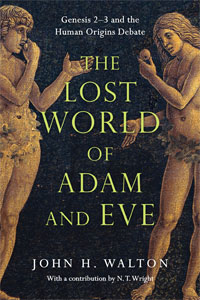 Adam, Eve, a garden, a snake, an apple. Images that pervade Western culture. Images viewed by many as mere myth and by others as absolute truth.
Adam, Eve, a garden, a snake, an apple. Images that pervade Western culture. Images viewed by many as mere myth and by others as absolute truth.
What really happened at the dawn of human existence? Were Adam and Eve real people? Was there really a Garden of Eden? Did sin really enter the world through a piece of fruit?
Do Christians really have to believe all this stuff, even when science seems to point in a different direction?
In his forthcoming book The Lost World of Adam and Eve: Genesis 2-3 and the Human Origins Debate (IVP Academic, $17) Wheaton College Old Testament Professor John Walton sets out to address these questions by exploring what the Bible says (and doesn’t say) about the origins of humanity.
Walton rejects the idea that there is “an essential, inherent conflict between the claims of the Bible and the current scientific consensus about human origins.” From his perspective,
The perceived threat posed by the current consensus about human origins is overblown. That consensus accepts the principles of common ancestry and evolutionary theory as the explanation for the existence of all life. … regardless of whether the scientific conclusions stand the test of time or not, they pose no threat to biblical belief.
Walton’s understanding of Genesis includes these core propositions:
- That Genesis 1 is an account of functional, not material origins. It describes God ordering the cosmos into a sacred space, but has virtually nothing to say about the scientific process of creation. (Walton explores these views more fully in his earlier book The Lost World of Genesis One.)
- That Genesis 2 describes not the material creation of the original pair of humans, but instead establishes Adam and Eve as archetypes. In other words, what is being said about Adam and Eve is not a unique account of material creation, but a description applicable to all humanity. It is a story of our “destiny and identity,” not our physical origins. This archetypal usage finds, he writes, further support in the New Testament, where “Paul’s use of Adam is more interested in the effect of sin on the cosmos than in the effect of sin on humanity, and has nothing to say about human origins.”
- That the Garden of Eden was created as a sacred space for encountering God. The universe as a whole functions as God’s temple, but the Garden functioned as the center of that temple. Adam and Eve were set apart as priests to administer this space.
- That Adam and Eve chose to make themselves, rather than God, the center of order and wisdom, and in doing rejected the role that God had given them. Thus, rather than developing and maintaining order, they gave way to disorder. Describing sin’s entrance into the world, Walton says:
Genesis 3 is more about the encroachment of disorder (brought about by sin) into a world in the process of being ordered than it is about the first sin. It is about how humanity lost access to the presence of God when its representatives tragically declared their independence from their Creator. It is more focused literarily and theologically on how corporate humanity is therefore distanced from God—alienation—than in the sinful state of each human being…
Undoubtedly some Christians will feel the Walton pushes the envelope entirely too far, that it is heresy to believe that there were humans prior to Adam, and that evolution is compatible with the Bible. Conversely, some may feel that in clinging to the authority of Scripture, Walton allows theology to unduly influence his exegesis.
Either way, Walton’s arguments should be taken seriously. The framework through which he understands the opening chapters of Genesis offers an important opportunity to reconcile faith and science. Understanding the narrative of Scripture as not merely about individual sin and individual salvation, but instead as a grand narrative about order and disorder, about the nature of God and the nature of humanity, and about function and relationship, has the potential to reshape how we live as Christians today. By allowing us to gain a better understanding of Adam and Eve’s “lost world,” Walton allows us to better understand the Bible, God and ourselves.
 Dan Wilkinson
Dan Wilkinson
Dan is the Executive Editor of the Unfundamentalist blog. He is a writer, graphic designer and IT specialist. He lives in Montana, is married and lives with two cats.